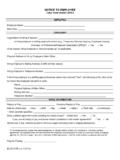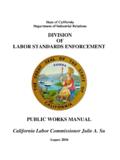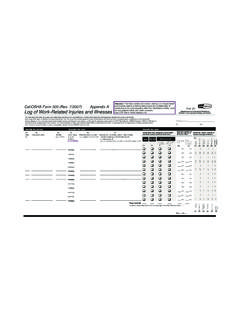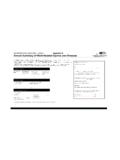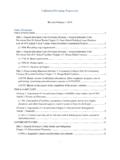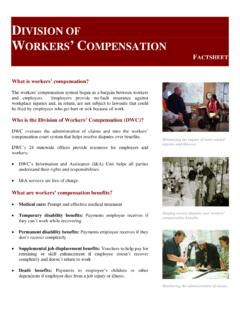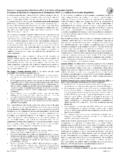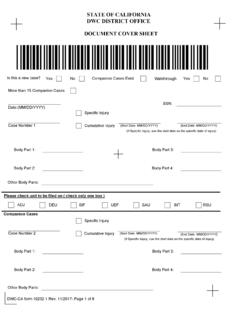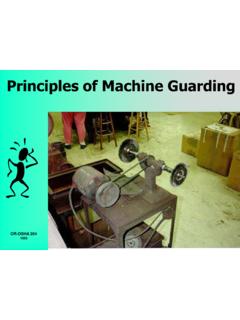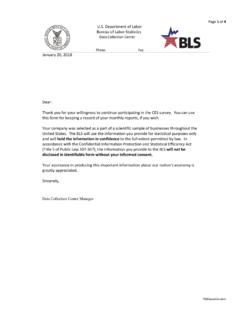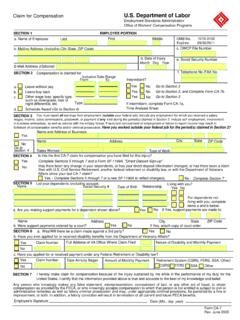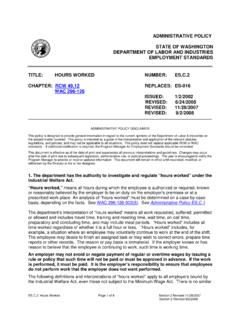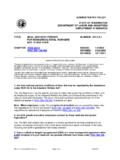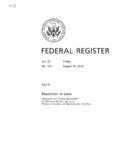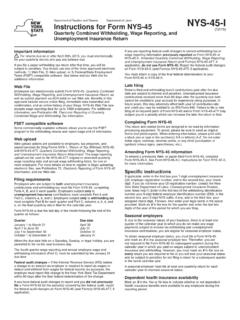Transcription of DEPARTMENT OF INDUSTRIAL RELATIONS …
1 STATE OF CALIFORNIA Edmund G. Brown Jr., Governor DEPARTMENT OF INDUSTRIAL RELATIONS . DIVISION OF LABOR STANDARDS ENFORCEMENT. FINAL PAY. Employees who are discharged must be paid all wages due at the time of termination. (Labor Code 201). All wages include any earned, but unused vacation pay. (Labor Code ) There is no requirement under California law that an employer pay accrued sick leave upon termination. An employer must pay a discharged employee at the place of discharge. (Labor Code 208). An employee who does not have a written agreement for a definite period of employment and who quits without giving prior notice, must be paid his or her wages within 72 hours.
2 If the employee gives at least 72 hours notice of his or her intention to quit, those wages must be paid at the time of quitting. An employee who quits must be paid at the office or agency of the employer in the county where the employee worked. An employee who quits without 72 hours notice may request that his or her final wage payment be mailed to a designated address. The date of mailing will be considered the date of payment. (Labor Code 202). An employer who willfully fails to pay any wages due an employee who is discharged or quits within the time frames provided under Labor Code 201 or Labor Code 202, may be assessed continuing wages as a penalty from the date the wages were due up to a maximum of 30 days.
3 (Labor Code 203) The penalty is calculated by multiplying the daily wage rate of the employee by 30 days. (Mamika v. Barca (1998) 68 487) Penalties under Labor Code 203 may be avoided if the employer can show that a good-faith dispute existed concerning whether any wages were due. A good-faith dispute means that the employer's defense, based on law or fact, if successful, would preclude any recovery on part of the employee. (Title 8 California Code of Regulations 13520). Even if there is a dispute, the employer must pay, without requiring a release, whatever wages are due and not in dispute.
4 If the employer fails to pay what is undisputed, the good faith defense will be defeated whatever the outcome of the disputed wages. (Labor Code 206). SEVERANCE PAY. There is no legal requirement under California law that employers provide severance pay to an employee upon termination of employment. Employees should refer to their employer's policy with respect to severance pay. Severance pay plans provided by an employer pursuant to the Employee Retirement Income Security Act of 1974, 29 1001, et seq. (ERISA), are subject to federal law. Contact the DEPARTMENT of Labor at In certain limited situations, California laws may apply.
5 However, a thorough review of the facts is necessary before a determination can be made. UNEMPLOYMENT INSURANCE. California participates in a joint federal/state unemployment insurance program, which is designed to reduce the impact of economic fluctuations and assist those persons who become unemployed through no fault of their own. Final pay (rev. 1/2011) 1. With few exceptions, all California employers are covered under the unemployment insurance law and must pay the appropriate unemployment insurance tax. A former employee will be ineligible for benefits if he or she is out of work for one of the following reasons: 1.
6 Voluntary quit without good cause; (Unemployment Insurance Code 1256). 2. Discharge for willful misconduct; (Unemployment Insurance Code 1256). 3. Refusal of suitable work; (Unemployment Insurance Code 1258). Employers are given the opportunity to respond to a claim for unemployment insurance by a former employee. (Unemployment Insurance Code 1327) Employers and employees that disagree with the final determination of a benefit payment have the right to appeal the determination. (Unemployment Insurance Code 1328). For additional information and eligibility requirements, contact the Employment Development DEPARTMENT at 800-300-5616 or at Final pay (rev.)
7 1/2011) 2.
